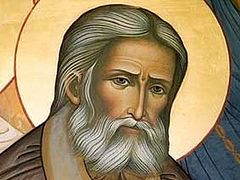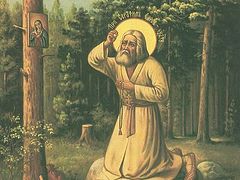
“The superior of the monastery,” he said, “should be perfect in all virtues, and the senses of his soul should be trained by long study in the discernment of good and evil (cf. Heb. 5:18).
“The superior should be experienced in the Holy Scriptures, he should study the Law of God day and night; thus by this exercise he might gain the gift of discernment of good and evil.
“The true knowledge of good and evil can be had only when the ascetic of piety comes to sympathize with the future judgment, and has a foretaste of eternal blessedness, which is formed in the souls of the pious even in this life, in a hidden and spiritual manner.
“Until a man has acquired discernment of good and evil he is not capable of shepherding rational sheep, only irrational ones, for without the knowledge of good and evil we cannot determine the activities of the evil one.
“Therefore the superior, as the pastor of rational sheep, must have the gift of discernment, so that in every situation he would be able to give useful advice to anyone who requests his instruction, for, as Peter the Damascene says (in the Philokalia, on the instruction of souls in the virtues, Part 3, page 52), not everyone can be trusted to counsel those who seek it—only those who have received the gift of discernment from God after long practice in asceticism, having acquired a keen mind.
“The superior should have the gift of penetrating thought, so that by understanding things past and present he might discern the enemy’s snares.
“One distinguishing characteristic of the superior should be his love for his inferiors: for the true pastor, according to the words of St John Climacus, is shown by his love for his flock. For it is out of love that the Chief Shepherd was crucified on the cross (from the chapter “To the Shephard, paragraph. 5).”
Other abbots, concerned for the salvation of those entrusted to their leadership, asked St. Seraphim about how to lead the brethren. In answer to one of them, St. Seraphim gave the following instructions:
“Let every superior always be as a wise mother to his subordinates.”
“A loving mother does not live for herself, but rather for her children. She bears the infirmities of her ailing children with love; if they should fall into uncleanness she washes them, cleanses them quietly and peacefully, dresses them in a new white garments, warms them, feeds them, consoles them, and tries to surround them with care, so that she might never hear them cry at all; such children are well-disposed to their mother. So should every superior live not to please himself, but to please his subordinates; he should be condescending to their weaknesses, bear the infirm with love, doctor their wounds of sins with the compress of mercy, lift up the fallen with meekness. He should quietly cleanse those who are befouled with some impure vice by requiring fasting and prayer of them above the norm; he should clothe them with instruction and his own exemplary life in the garment of the virtues, be unceasingly vigilant over them, console them in every way, and guard their peace and well-being on all sides, so that he might never hear the slightest cry or murmuring from them. Then they will strive with zeal to provide the superior with peace and calm.”
In 1830 one hieromonk who had been called from Sarov to the position of abbot in Kazan diocese came to Fr. Seraphim to receive his blessing. He found the elder in the forest working the garden, and he approached him silently, not saying a word. Fr. Seraphim, having seen the brother coming to him from afar off, sang the photogogicon to the cross from beginning to end: “The cross is the guardian.…” Then Fr. Seraphim asked his visitor, “Where are you going brother?”
“They are calling me to Kazan,” he answered.
“A deception is going with you, brother,” Fr. Seraphim answered, adding, “Do not go to St. Macarius Hermitage. (St. Macarius Hermitage is situated in the hills near the town of Sviazhska and is known as Podgornaya.)
“They are not calling me to St. Macarius Hermitage, batiushka Seraphim, but to Raithu to be the abbot,” the brother told him, meaning to correct the elder’s mistake.
But Fr. Seraphim continued in the same vein. “I tell you, do not go to St. Macarius’.” Then having thought a little, he said, “Well, live outside of Sarov for a little while…. You’ll then come back to us, and we’ll die here in the God-saved Sarov Hermitage. Then, blessing the brother, the elder bade him go in peace.
The brother departed. When he arrived in Kazan, he learned that he had been appointed not to Raithu, but to St. Macarius Monastery. Recalling the words of Fr. Seraphim when he said so insistently “Do not go to St. Macarius’,” he refused this appointment and was sent to build the Tsivilsky Tikhvin Monastery.
Mrs. P. I. Shrarina, who from the year 1827 enjoyed Fr. Seraphim’s particular trust, witnessed that even a year prior to the first outbreak of cholera in 1830 and 1831, he said, “God’s wrath is upon Russia, and a death-bearing cholera is approaching. Be vigilant and pray, that the hour of death may come upon you unawares.”
When the cholera epidemic came to Russia, it visited the Tikhvin Monastery where that Sarov brother was building. The disease forced him to request the authorities to release him from the monastery. He returned to Sarov.
Many people came to Fr. Seraphim wishing to join a monastery, and asked his advice and instruction. The elder gave useful advice according to the clairvoyance given to him by the Lord, and often foretold the future.
Thus, in 1830, one novice from Glinsk Hermitage came specifically to Sarov to ask Fr. Seraphim if God blessed him to enter monasticism. The young man, who did not yet know himself well and had not ascertained a firm thought about his calling, wavered between the world and the monastery. He had no one to whom he could trust his thoughts, no one close to him who could decide his life’s question. So the novice from Glinsk came to Fr. Seraphim, fell at his feet, asking him to release his soul from this wave of doubt. He asked if it was God’s will that he and his brother Nicholas join the monastery. Did not Fr. Seraphim himself some years earlier appear in the same way to the recluse Dositheus in Kiev? He answered the novice, “Save yourself, and your brother as well.” Then, having thought a little, he said, “Do you recall the life of St. Ioanicius the Great? While wandering through towns and countryside he accidently dropped his staff into a precipice. It was impossible to retrieve the staff, and the saint could not walk any further without it. Deeply grieving he called out to the Lord God, and an angel of the Lord invisibly handed him a new staff.”
Having said this, Fr. Seraphim placed his own walking stick into the novice’s hand and pronounced, “It is difficult to guide human souls! However, amidst all your sorrows and afflictions in directing the brothers’ souls, an Angel of the Lord will constantly be with you until the end of your life.”
After this the novice decided to enter the monastery. He was given the name Paisius at the tonsure and in 1856 he was raised to the rank of abbot in the Astrakhan Churkinsky St. Nicholas coenobetic monastery, and six years later was raised to the rank of Archimandrite of the same monastery, thus becoming a pastor of human souls, according to the words of St. Seraphim. His brother, about whom Fr. Seraphim had said, “Save your brother as well,” joined the monastery with the name Nazarius, and ended his days in the Kozeletsk St. George Monastery in the rank of hieromonk.
Fr. Seraphim instructed those brothers in positions of authority, but he also instructed those under their authority in their obligations regarding submission to leaders.
“Acquire humility, obedience, and submission, and you will be saved,” he quoted the words of St. Barsanuphius. “And by no means must you contradict, saying, ‘what is this and why is this?’ but rather have a goodly submissiveness, especially to your abba, who takes care of you for God’s sake, and to whom your soul has been entrusted.” (St. Barsanuphius, answer 242.)
“He who truly desires to be a disciple of Christ does not have the authority over himself to do something of his own accord, says the same teacher. For whatever is done according to one’s own thoughts is not pleasing to God, even though it may seem good. If one considers that he knows better than the abba what is best for himself, then why call himself his disciple?
“One in submission submits in all things, and does not worry about his own salvation, because another is tending to it, to whom he has submitted and entrusted himself. Whoever has cut off his own will in one thing and not another has actually had his own will even in that which he had cut off.
“Turn away your will and preserve humility in all your life, and then you will be saved. Humility and obedience are the uprooters of all the passions and the planters of all the virtues.” (St. Barsanuphius, answers 309, 357, 551, 618, 68, 226).
“One under authority should mortify his passions for this temporary life in order to have eternal life. For just as the flax is beaten, trampled, brushed, washed, and it becomes white as snow, so does the novice by bearing humiliation, insults, and calumny become pure as silver, shiny and cauterized by the fire (St. Antiochus, Homily 113.)
“One must not meddle with the superior’s business and judge them. This is an insult to God’s magnificence, from Whom authority is granted; for there is no power but of God: the powers that be are ordained of God (Rom. 13:1)
“One should never oppose authority for the good, so that he might not sin before God and be subjected to His righteous punishment, for Whosoever therefore resisteth to power, resisteth the ordinance ordinance of God; and they that resist shall receive to themselves damnation (Rom. 13:2).
“The obedient makes much progress in establishing his soul, besides which he gains much understanding through this about things, and comes to compunction.”
Many of the beginning monks asked Fr. Seraphim’s advice and instructions as to how to save themselves and those close to them. Fr. Seraphim answered thus: “Whether you came to the monastery according to counsel, or by another’s authority, or by any other way, do not be downcast—there is God’s visitation. For if you do as I have instructed you, you will be saved as well as your close ones about whom you care—as the Prophet says, I have not seen the righteous man forsaken, nor his seed begging bread (Ps. 36:25). Living in this community, do the following: while standing in church, attend to yourself and do not let go, know the order of church services, that is, learn to contain in your understanding the services of Vespers, Compline, Midnight Office, Matins, and the hours.



